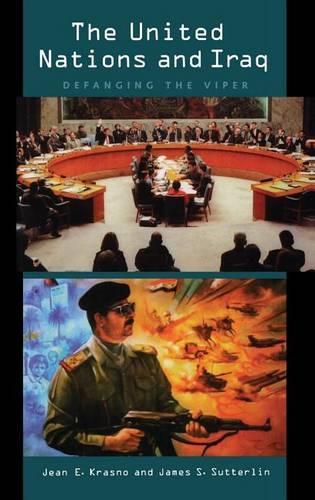
The United Nations and Iraq: Defanging the Viper
(Hardback)
Available Formats
Publishing Details
The United Nations and Iraq: Defanging the Viper
By (Author) Jean Krasno
By (author) James S. Sutterlin
Bloomsbury Publishing PLC
Praeger Publishers Inc
28th February 2003
United States
Classifications
General
Non Fiction
341.73509567
Physical Properties
Hardback
264
Width 156mm, Height 235mm
539g
Description
Following the Gulf War from 1991 to 1998, the United Nations Special Commission (UNSCOM) was created to unveil and eliminate Iraq's weapons of mass destruction through inspections. This study describes how UNSCOM was designed to maintain its independence and authority, detailing the dramatic events that occurred as UNSCOM attempted to deal with an intransigent Iraq. Krasno and Sutterlin outline the special intelligence skills that UNSCOM developed over the years in response to Iraqi tactics. They also provide an accounting of UNSCOM achievements and analyze remaining concerns. Along with documentary research, much of the information in this book was obtained through a series of interviews with key players, including the Executive Directors, several UNSCOM inspectors, and a number of ambassadors to the United Nations who were directly involved. Concerns about Iraq's remaining weapons capabilities, particularly its biological and chemical weapons, have become increasingly relevant since the September 11, 2001 terrorist attacks and the ensuing anthrax threat. This study provides insight about the disarming of Iraq, as well what lessons can be learned from the UNSCOM experiment.
Reviews
"A hot topic and a fascinating piece of sleuthing with new interview material."-Bruce Russett Director of United Nations Studies Yale University
Krasno and Sutterin, both political scientists at Yale, offer an in-depth study of the United Nations' Special Commission (UNSCOM) and its efforts to find and eliminate Iraq's weapons of mass destruction in the 1990s. Drawing on documentary evidence as well as interviews with the executive directors and members of the commission, they outline the inspectors' work, Iraq's "noncompliance and untrustworthy behavior," and the achievements the commission had in spite of that behavior. It may seem moot at this point, given that war with Iraq is a fait accompli, but for those interested in assessing for themselves the role of UNSCOM's work, this is balanced and enlightening--if dry--reading.-Publishers Weekly Online
Krasno and Sutterlin provide a thorough analysis of UNSCOM, the UN Special Commission charged with eliminating weapons of mass destruction in Iraq during 1991-98....deals with fascinating subjects, such as the fact that US U-2 intelligence planes were put under UN authority and control. The comparison between the two heads of UNSCOM--Rolf Ekeus of Sweden and Richard Butler of Australia--is also highly interesting. Building on books by some of the individuals involved--such as Butler, Scott Ritter, and Tim Trevan--this study provides much useful information not only on Iraq's weapons policy under Saddam Hussein, but also on the UN system and foreign policy. Highly recommended. Upper-division undergraduates and above.-Choice
"Krasno and Sutterin, both political scientists at Yale, offer an in-depth study of the United Nations' Special Commission (UNSCOM) and its efforts to find and eliminate Iraq's weapons of mass destruction in the 1990s. Drawing on documentary evidence as well as interviews with the executive directors and members of the commission, they outline the inspectors' work, Iraq's "noncompliance and untrustworthy behavior," and the achievements the commission had in spite of that behavior. It may seem moot at this point, given that war with Iraq is a fait accompli, but for those interested in assessing for themselves the role of UNSCOM's work, this is balanced and enlightening--if dry--reading."-Publishers Weekly Online
"Krasno and Sutterlin provide a thorough analysis of UNSCOM, the UN Special Commission charged with eliminating weapons of mass destruction in Iraq during 1991-98....deals with fascinating subjects, such as the fact that US U-2 intelligence planes were put under UN authority and control. The comparison between the two heads of UNSCOM--Rolf Ekeus of Sweden and Richard Butler of Australia--is also highly interesting. Building on books by some of the individuals involved--such as Butler, Scott Ritter, and Tim Trevan--this study provides much useful information not only on Iraq's weapons policy under Saddam Hussein, but also on the UN system and foreign policy. Highly recommended. Upper-division undergraduates and above."-Choice
Author Bio
JEAN E. KRASNO is a Fellow, International Security Studies, Yale University. JAMES S. SUTTERLIN is Distinguished Fellow in United Nations Studies at Yale University and Adjunct Professor of Political Science at Long Island University.
